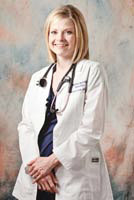Catherine York is on the frontlines in the battle against renal disease and kidney disorders as a family nurse practitioner at Springfield Nephrology Associates Inc.
Renal disease is a growing problem across the country, and York says her role as a family nurse practitioner allows her to fill a critical role in helping other health care providers identify and treat the various stages of chronic kidney disease.
“I’m the kind of person who can get bored easily, and this is a field where you definitely can’t get bored,” she says, adding that she has worked in nephrology for more than four years.
York earned her bachelor’s degree in nursing at the University of Arkansas Eleanor Mann School of Nursing and her Master of Science in Nursing through Missouri State University’s family nurse practitioner program.
She says she was drawn to work in health care after growing up watching her dad help patients.
“My mom is a nurse, and my dad is a physician. When I was small, I used to make the rounds with my father, and … I just kind of knew that was what I wanted to do,” York says.
Because she sees patients in their homes, at the office and in hospitals, she is engaged by a constant change of pace.
“I also do procedures, and so I’m able to do many things throughout the day … different things that are all complex and keep me busy, ” says York, a nurse practitioner since 2006 who worked at Skaggs Cardiology Associates in Branson prior to joining Springfield Nephrology Associates.
She says the two main causes of end-stage renal failure are diabetes and hypertension – issues that are becoming more prevalent with today’s aging population.
York is engaged in opportunities for continuing education, and she tries to attend at least one national meeting a year related to her specialty, in addition to reading medical journals. In October 2009, she says she was proud to be a presenter at an Advanced Practice Nurses of the Ozarks Nephrology Conference.
“I like to be able to help people and know at the end of the day that I’ve helped somebody feel not so scared about their disease or helped somebody to understand what we can do to slow things down because a lot of times people come into our office and they are unsure about what to expect,” York says. “I think educating them at their level and helping them to understand what’s going to happen is something that I pride myself on being able to do.”
Click here for full coverage of the 2011 Salute to Health Care.[[In-content Ad]]
